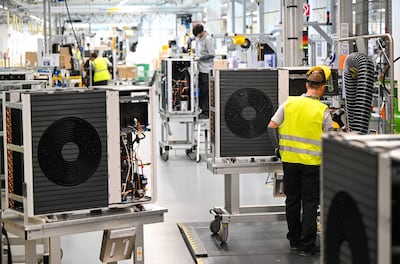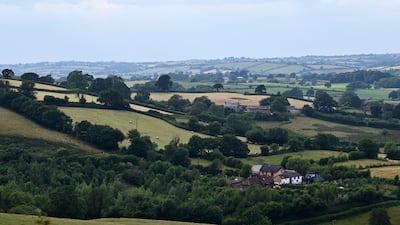The UK was urged on Wednesday to tackle “misinformation” putting households off switching to heat pumps, amid signs ministers could delay a ban on using heating oil.
Conservative MPs have raised concerns about the plan to make rural homes go green by blocking the installation of new oil boilers from 2026.
One former minister, George Eustice, has warned the ban could amount to a “rural Ulez” – referring to a low-emission zone in London that generated a backlash because of fears of high costs for motorists.
A report published on Wednesday by climate think tank E3G said heat pumps could cost as much as £13,000 ($16,600) to install, but would last longer and be more efficient than old-fashioned boilers.
Government grants for upgrades are available but many people do not know they exist, and some criticism of heat pumps has been inaccurate, said Juliet Phillips, a policy adviser for E3G.
“There’s a lot of misinformation about them not working. We’ve seen lots of European countries which are much colder than ours making use of heat pumps,” she told The National.
“I think countering some of that misinformation, and promoting the schemes in a way which is more accessible to households, would be really good because there is actually a lot of support out there.”
About 1.1 million UK homes are not connected to the gas grid and many use kerosene as a heating oil. Electrically-powered heat pumps work similarly to fridges or air conditioners in reverse, extracting warmth from the air or ground.

The proposed oil ban is part of the UK’s push to bring down carbon emissions from heating and reach net zero by 2050.
However, there has been talk of a delay and Ms Phillips said the ban appeared to have been “kicked into the long grass”, with no consultations yet taking place that would be needed for a 2026 cut-off.
“There is an expectation now that the government will push back the timeline,” she said.
“There might be a phased approach. The government might start with the most high-polluting fossil fuel heating systems like coal first, because that’s a very small part of the population.”
After anger at the Labour-backed Ulez expansion in London was credited for a Conservative by-election victory, ministers have sought to draw a dividing line with the opposition on environmental issues.
Prime Minister Rishi Sunak has branded himself a friend of the motorist and backed hundreds of new North Sea drilling licences in an overt rebuke to Just Stop Oil protesters.
Mr Eustice, a former environment minister, wrote in the Daily Telegraph that households should be encouraged to use fuels made from cooking oil or vegetable waste rather than switching to heat pumps.
He warned that rural communities were “about to have their own version of London’s ultra-low emission zone dumped on them”.
Heat pumps have also generated a backlash in Germany. A bungled push to ban gas boilers was blamed, in part, for a far-right surge in the polls at the expense of the governing Greens.


